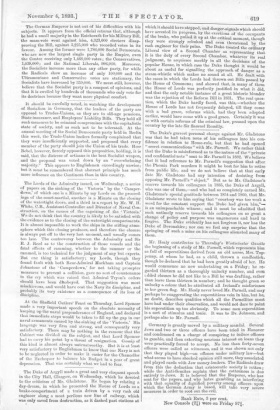The Duke of Argyll made a great and very eloquent
speech in the City Hall, Glasgow, on Wednesday, which he devoted to the criticism of Mr. Gladstone. He began by relating a day-dream, in which be presented the House of Lords as a brake-compartment of a train driven by a very rash old engineer along a most perilous new line of railway, which was only saved from destruction, as it dashed past stations at which it should have stopped, and danger-signals which should have arrested its progress, by the exertions of the occupants of the brake, who pulled it up at the critical moment, though they were strongly rebuked and even threatened by the rash engineer for their pains. The Duke treated the ordinary Liberal view of a Second Chamber as representing that it is the duty of every Second Chamber, whatever its real judgment, to acquiesce meekly in all the decisions of the popular House, in which case the Duke thought it would be about as useful for signalling the approach of danger as a steam-whistle which makes no sound at all. He dealt with the cases in which the Lords had thrown out Bills passed by the House of Commons; and showed that, in many of them the House of Lords was perfectly justified in what it did, and that the only notable instance of a great historic blunder was the rejection of the Reform Bill in 1831. The real ques- tion, which the Duke hardly faced, was this,—whether the House of Lords has not frequently delayed, till they come with a bad grace, reforms which, had they been adopted earlier, would have come with a good grace. Certainly it was so with certain reforms of the criminal law, pressed upon the country by the late Sir Samuel Hominy.




















































 Previous page
Previous page